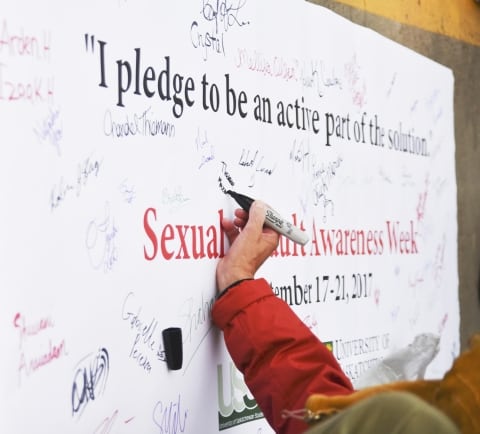
The USask Student Campus Community Coalition Against Sexual Violence will plan their future efforts this summer.
Following the University of Saskatchewan Students’ Union general election on March 22, a group of students concerned with the perceived implications of the sexual-assault allegations circulating against the USSU president-elect decided to form the USask Campus Community Coalition Against Sexual Violence.
The coalition was created shortly after the election results were announced, at a meeting of student protesters in the Gordon Oakes Red Bear Student Centre. The group’s aim is to advocate for survivors of sexual assault and respond to their allegations tangibly, not only in the context of the USSU elections but also in regards to the wider systemic problems that are being discussed in the aftermath.
Mackenzie Paradzik, a fourth-year political studies student and spokesperson for the coalition, explains that, even though the group was formed in response to the allegations surrounding USSU president-elect Coden Nikbakht, they plan to broaden the scope of the coalition.
“We don’t believe that he is someone that exemplifies what is expected of a leadership role,” Paradzik said. “But obviously this issue doesn’t only exist in the context of [Nikbakht’s] election. We hope that this group can be a response to the systemic issue of rape culture in our society and on this campus.”
The coalition aims to address perceived gaps in the university’s responses to sexual violence. Paradzik believes that the USSU general election was symptomatic of existing problems, citing a lack of supports for sexual-assault victims on campus, which is an issue that the coalition wants to change.
“The lack of response from the USSU and the university has set a precedent that shows that their cares don’t [lie] with survivors of sexual assault and that this campus is not safe for people who have experienced it,” Paradzik said. “We want to be a group on campus that is there in support of survivors and mobilizes against sexual assault in a tangible way.”
Despite being a student movement concerned with improving the university community, the coalition is not ratified by the U of S. Paradzik states that the group deliberately exists as an entity separate from the university, as some of their aims don’t align.
“After the lack of response that we have received from the USSU administration, we are not trusting of their respect for survivors,” Paradzik said. “Right now, we are separate from the university, even though we are a group made up of students from the U of S.”
Paradzik explains the importance the coalition places on decisive action to create change. The group’s Facebook page states that they “will not remain silent or neutral” on the issue of sexual assault. Paradzik says that actively advocating for survivors is the coalition’s main focus.
“It’s important to not be silent as a community in regards to this,” Paradzik said. “Our main goal is to stand against sexual violence by amplifying the voices of the survivors. Action and speaking out is necessary to combat the conditions that exist right now.”
As for the future, the coalition will co-ordinate their efforts over the summer. Currently, the group is collecting signatures dissenting against Nikbakht’s presidency. To put forward a vote of
non-confidence, the signatures of 7.5 per cent of undergraduate students at the U of S are required.
If the position becomes vacant on or before October 31, it will result in a by-election; if it is vacated after that, the University Students’ Council will decide whether to split the duties of the role or hold a by-election.
—
Ana Cristina Camacho / Staff Writer
Photo: J.C. Balicanta Narag / Outreach Director
Leave a Reply